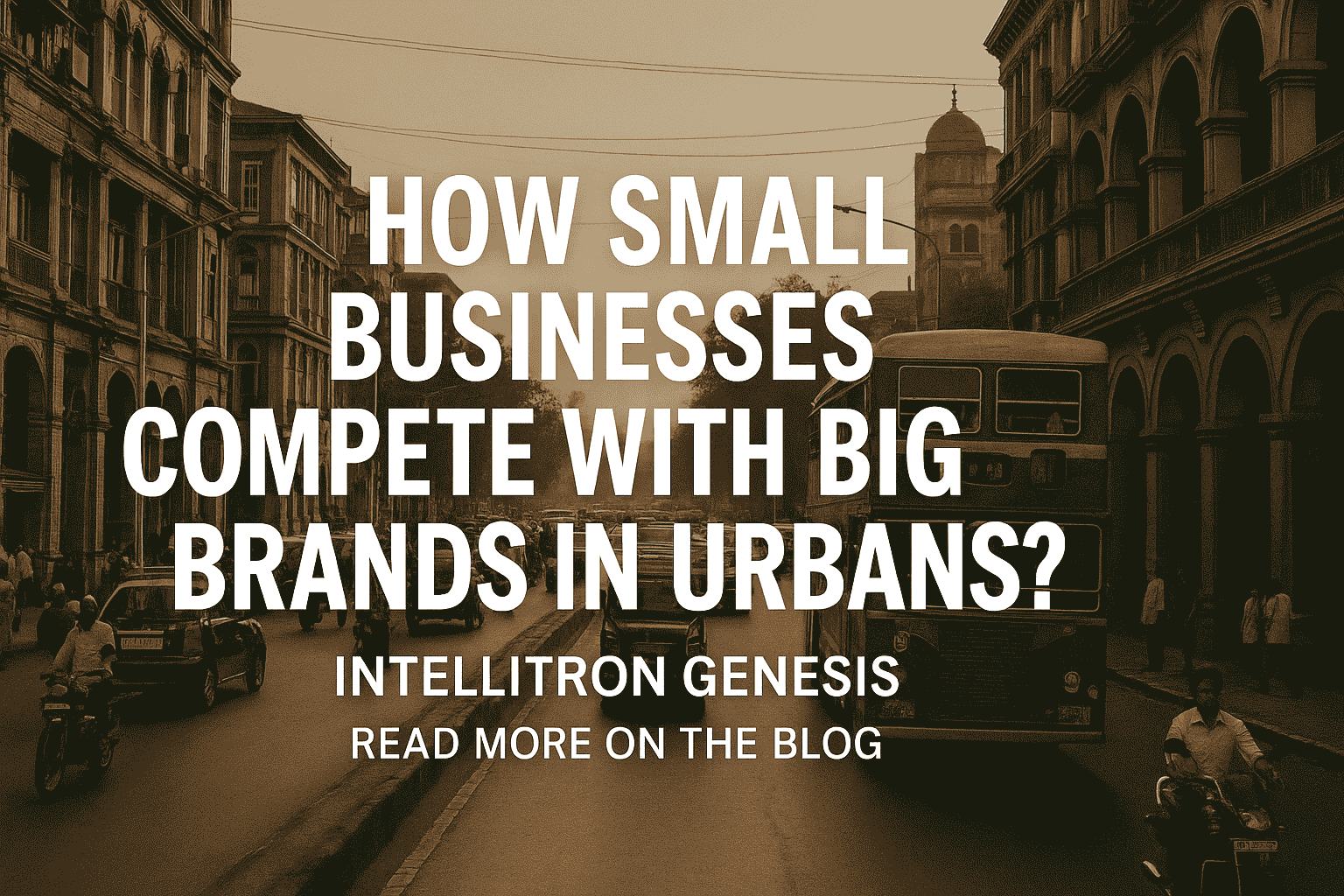
How Small Businesses Compete with Big Brands in Urban Markets
In bustling metro cities like Mumbai, New York, London, or Singapore, the marketplace is saturated with big-brand visibility, polished advertising campaigns, and omnipresent digital footprints. For small businesses, this presents a challenge—but also a unique opportunity.
While large corporations may have resources, global teams, and brand recognition, small businesses are agile, authentic, and embedded in their local communities. At Intellitron Genesis, we believe that when small businesses harness the right tools and strategies, they can thrive—and even outperform—their larger counterparts.
Here’s a comprehensive breakdown of how small businesses can stay competitive and relevant in urban markets:
1. Niche Down to Stand Out
One of the key advantages small businesses hold is the ability to specialize. Unlike large corporations that cater to broad markets, small businesses can focus on a very specific customer base with unique needs. This kind of specialization creates deeper relevance and loyalty within a well-defined audience.
For example, instead of targeting “beauty services,” a small salon in Bandra might focus on “chemical-free bridal skincare for South Mumbai brides.” Such strategic narrowing allows for higher conversion rates and greater brand affinity.
Small businesses should build marketing campaigns, website SEO, and social media content around this niche. This precision targeting is difficult for large brands to replicate at scale and becomes a powerful asset for local entrepreneurs.
Read our related blog: Why Every Business in Mumbai Needs a Digital Presence – 2025 Perspective
2. Geo-Targeted Social Advertising
Large brands often run national or global ad campaigns that may not always align with hyperlocal sentiments. Small businesses, however, can leverage platforms like Facebook, Instagram, and Google Ads to run location-specific campaigns tailored to their own city, neighborhood, or even a street.
In a city like Mumbai, different localities have vastly different consumer behaviors. Geo-targeted ads allow businesses to tailor their messaging, offers, and visuals to the local culture, language, and expectations of their target audience.
For instance, a tutoring center in Andheri can run a special offer exclusively for students residing within a 5 km radius. The result is a higher click-through rate and better ROI than generic advertising.
Read more: How Can I Make My Business Visible Online in a Metro City Like Mumbai?
3. Personalize Customer Experience at Scale
What large brands gain in volume, they often lose in personal connection. Small businesses have the advantage of interacting with customers directly, understanding their preferences, and creating memorable experiences. Personalized communication can turn occasional buyers into loyal customers.
Remembering returning customers, following up after service, sending personalized WhatsApp messages, or offering a custom deal based on past purchases—these are actions small businesses can take swiftly and consistently. This personalized approach builds deep trust and brand loyalty that multinational corporations struggle to foster on an individual level.
Moreover, businesses should integrate CRM systems to keep track of customer behavior and optimize touchpoints. Digital tools make personalization scalable even for small teams.
Read more: How Can I Start Freelancing or a Side Hustle While Living in Mumbai or Any Metro?
4. Collaborate with Hyperlocal Influencers
Influencer marketing is not just for global beauty or tech brands. In fact, micro and hyperlocal influencers—those with smaller but highly engaged follower bases in specific areas—offer much higher trust and relevance to local audiences.
These influencers can become genuine brand advocates, especially when they already use or believe in the product or service being offered. For instance, a food vlogger from Navi Mumbai may drive more effective footfall to a local eatery in Vashi than a pan-India celebrity endorsement.
Small businesses should explore partnerships with these content creators through barter deals, local event collaborations, or long-term community campaigns. The influence and word-of-mouth value generated can significantly increase local brand visibility.
Read more: How to Leverage Influencer Marketing in Mumbai’s Crowded Market
5. Use Storytelling to Build Emotional Connections
One of the most powerful ways to compete with big brands is through authentic storytelling. Large brands often focus on polished, scripted advertisements. Small businesses, however, can tell real stories about real people, from their founders to their frontline workers to their most loyal customers.
Sharing behind-the-scenes glimpses, community events, your business origin story, or social causes you support makes your brand more relatable and human. Consumers in metro cities—especially younger demographics—crave authenticity and transparency. They are more likely to support brands that align with their values or emotional identity.
Consistent storytelling across your website, social media, and even packaging can create long-term brand equity and loyalty.
Read more: Why Storytelling is the Future of Digital Marketing in Urban India
6. Capitalize on Agility and Speed
In fast-moving urban markets, trends can change in a matter of days. What is relevant on a Monday may become outdated by Friday. Small businesses have the ability to react quickly to these shifts—whether it’s a new Instagram trend, a local event, or a sudden change in consumer sentiment.
Unlike large organizations, which often go through long approval chains, small businesses can test and implement campaigns, promotions, and creative content in real time.
For example, a local bakery could instantly launch a monsoon-themed dessert offering in response to unexpected seasonal rains, complete with same-day social media promotion. Such agility ensures relevance, timeliness, and market responsiveness.
Read more: How to Use Trend-Based Content to Stay Relevant in Mumbai
Conclusion: The Future Favors the Bold and Local
Urban markets are increasingly competitive, but not insurmountable. Small businesses can win by being sharp, authentic, and digitally aware. The key is to lean into strengths that big brands can’t replicate—local knowledge, human connection, speed, and specialization.
At Intellitron Genesis, we help small businesses like yours build digital roadmaps, from website development and SEO to geo-targeted campaigns and influencer partnerships.
If you are ready to shift the narrative and gain the competitive edge in your city, we are ready to guide you.
Explore more digital growth strategies and insights here:
https://intellitrongenesis.com/blog

0 comments